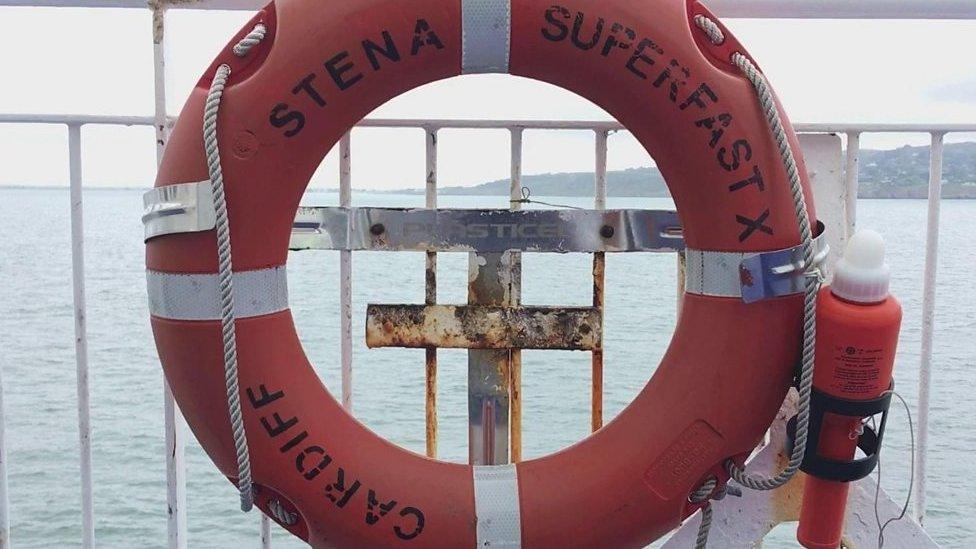EU vote: 60 miles and a world apart? Holyhead and Dublin.
- Published
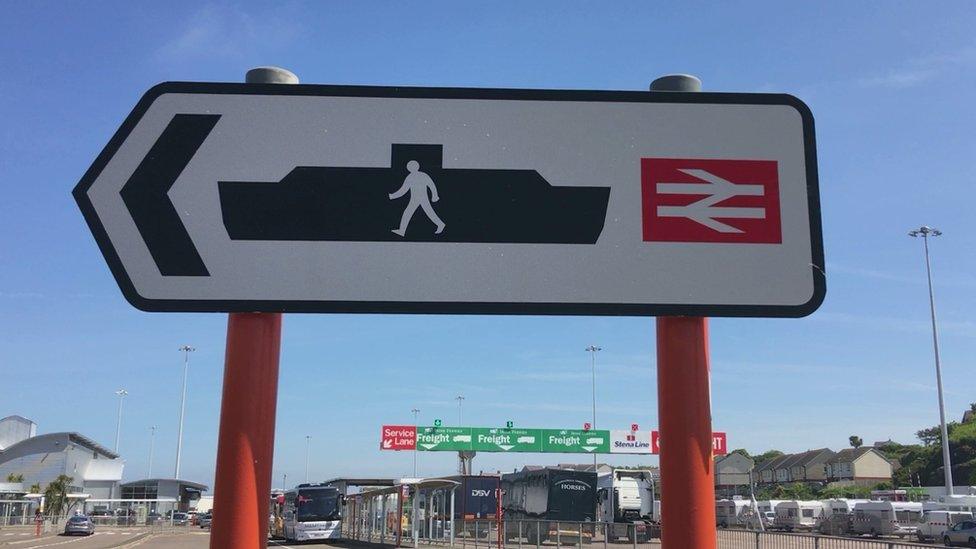
The referendum on the United Kingdom's membership of the European Union is rapidly approaching, but what does it mean for those places that find themselves at the centre of the debate - whether they want to be or not?
BBC Wales reporter George Herd has been in the port town of Holyhead on Anglesey - and across the Irish Sea to the Republic of Ireland's capital, Dublin.
It is pub quiz question time: What links a truckers' rest and odds of 4/11 that the UK will vote to stay in the EU come the vote on June 23?
That was the price on offer at the weekend from a well-known High Street bookies chain you can find in Holyhead on Anglesey.
The link? The founder and owner of the bookmakers also happens to be the co-owner of the Road King truck stop and cafe on the edge of the town.
There, staff have just thrown a party to celebrate the venue's first birthday, and the £7m gamble to build it in the first place.
It was a gamble based on the simple premise: location, location, location.
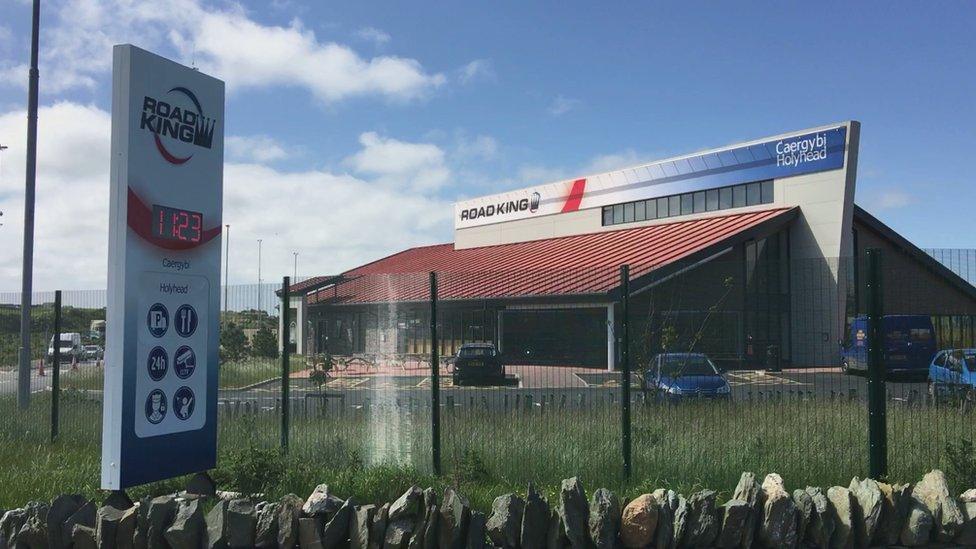
The E22 international Euro route of motorways, autobahns and dual-carriageways runs 3,300 miles from near the border of Kazakhstan through Russia ending in the UK at Holyhead.
In Britain, it is a well-travelled path.
In the 19th Century, the engineer Thomas Telford famously built the A5 road from London for very similar reasons.
Like the E22, it ended in Holyhead, the gateway to the Irish Sea and to Dublin.
And those links between Holyhead and the Irish Republic remain vitally important in 2016.
Especially if you are in the truck stop business, like the Road King's manager, Kevin Eyres.
"Nobody was looking after the truckers. They were in service stations, fast-food restaurants - it's not a lifestyle for them," he states, sipping from a large ubiquitous mug of truckers' tea.
"There was a big gap in the market to look after the HGV drivers."
A year since opening and the truck stop manager is happy with the way business is shaping up.
But will the EU referendum get engines revving at the Road King - or will they stall? Will a Brexit hit the business plans?
EU vote: Irish Sea links with Wales
On paper - perhaps it will, says the truck stop boss.
"If you come out of the EU there are going to be trade agreements that are torn up and stopped.
"Realistically - I don't think so. You can't just stop. So I don't think it will affect us that much, that's my feeling at the moment."
That is his business view - better in Europe than out. His personal opinion though - that is a different matter.
"I think we've got issues in the UK. I think we need to get away from Brussels where people are appointed and not elected, people making decisions for us - for our old people, our health service, our education - I think that is wrong.
EU vote: Views from the Welsh port town of Holyhead
"So I think probably, on a personal level, I'm out at this moment in time."
A short drive from the truckers' rest, you arrive at the port itself. It is hard to miss - it defines and dominates this Welsh town.
The port is run by the international ferry operator Stena Line. Overseeing the operations is Holyhead port manager, Wyn Parry.
"We're quite a strategic port, not just for the UK but for Wales as well," he states, viewing the harbour below his office that covers 260 hectares of sea sheltered by a 2.4km breakwater, the longest in Britain.
"Through this port we're transporting 2.1 million passengers per annum, 500,000 cars, and approximately 400,000 freight vehicles - so yes, we're an important port."
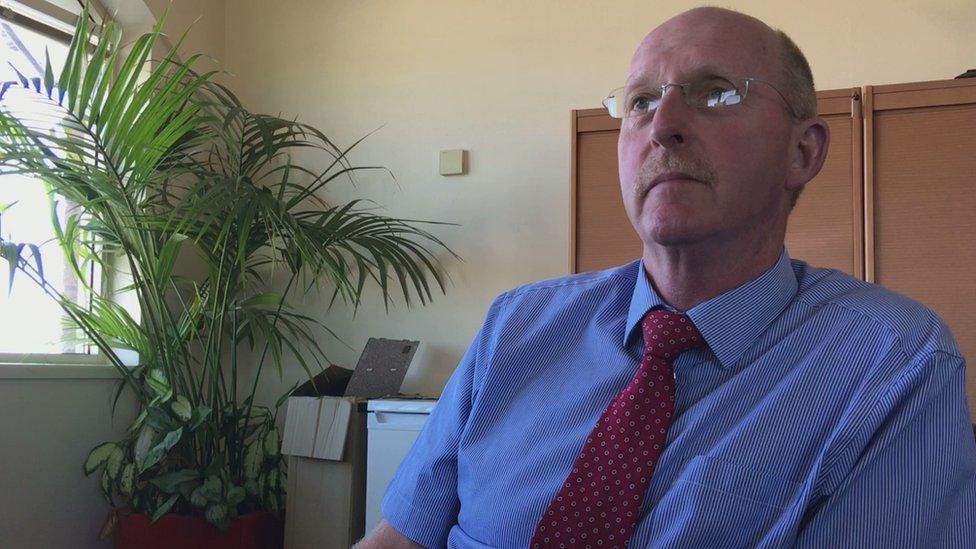
Holyhead is in fact the second busiest passenger sea port in the UK, with 10 sailings every day making the trip across the Irish Sea.
Rival operator Irish Ferries has just announced it is to invest £100m in a new 1,800-passenger ferry on the Holyhead route, reflecting what the company describes as the "confidence" underpinning the freight and tourism trade between Ireland and the UK.
But the Stena port manager is reluctant to be drawn into the debate on the EU referendum. Officially, Stena Line are sitting on the fence in this debate.
Wyn Parry does accept thought that there are some key facts in play for Holyhead.
"Geography sort of dictates how busy this port will be. Ireland is 58 miles away - that can't change," he notes.
"Trade will continue. The uncertainty, of course, is how that trade will continue. What will be the bureaucracy added to the process? I have no idea.
Ferry passengers heading for Dublin debate Brexit
"So there is an uncertainty in our business, and we wait for the outcome really."
Docked in the port is Stena Line's Superfast X ferry, ready to make one of its daily crossings to Dublin.
On board, a mix of tourists and truckers, travellers and traders rub shoulders in the restaurants and bars, passing the time.
There is a varied mix of views on the EU referendum.
"I've never known a happy divorce - and if we leave it's going to be nasty," says a native of Canada, who now has British citizenship.
"I've just turned 60 and I don't want a miserable sixth decade. I'm definitely in."
Trisha and Gerald Cheeseman, from Norwich, are heading to Dublin for a holiday. They both have their feet firmly in the out camp.
"We've listened to all the arguments and and we think the ones that say they would like to come out, ex-politicians etc., sound the best, sound the most sensible," argues Mr Cheeseman.
"The others seem to be scaremongering, and I'd just like us to have our independence."
Mrs Cheeseman chips in: "I fear our laws and country are going to be ruled by Europe really."
Three hours later, as the Superfast X pulls into Dublin, it is clear why the port is Ireland's second largest industrial estate, employing 4,000 people.
Containers are stacked from every visible viewpoint, cranes swinging back and forth, and lorries weaving in and out of the rows of metal boxes.
An estimated 42% Ireland's exported wealth comes through Dublin.
Perhaps that is why a 10-minute bus ride away in the city centre, trade unionists are actively campaigning for the UK to stay in Europe.
The Irish Congress of Trade Unions - Ireland's equivalent of the TUC - represents workers in both the republic and in Northern Ireland.
Taking the views on Dublin's Grafton Street
The congress has about 200,000 members in Northern Ireland - and they are not backing Brexit.
"They believe it would be bad for jobs, bad for the economy, bad for trade, bad for all-Ireland contacts, in terms of community and economy," argues the congress' Macdara Doyle at their Parnell Square office.
"Possibly, also bad then in terms of the imposition of a possible land border in the UK.
"There are no groups that I am aware of that are campaigning for a Brexit. Most people recognise it would have quite severe implications. Nobody really knows what will happen on the other side."
But it is not unequivocal support for the EU - far from it.
"Our stand on this is not a support of the current economic policy of the European Union. We are very much definitely strong opponents of that - but we don't believe you build a social Europe by breaking up Europe."
But anti-Brexit sentiment of the trade unions is not a view shared by the economist David McWilliams, writing in the Irish Independent.
"If the Brits decide to leave the EU and this undermines the UK as a location for investment (as the official view suggests), then some of the US investment in the UK will be diverted," he suggests.
"If this is the case, where will this investment be diverted to? Ireland is an obvious answer.
"We could win big if it's a vote to leave."
Could other winners be the Irish fishing community? According to one industry insider, if the shoe was on the other foot, fishing communities in Ireland - north and south - would be backing a Brexit.
"There's a lot of sympathy in those communities for leaving the EU," says Francis O'Donnell, the chief executive of the Irish Fish Producers Organisation, external.
"We have the situation where 82% of the fish taken out of Irish waters are by non-Irish vessels.
"3.5bn Euros of fish are being taken out every year. We have lorries taking fish from vessels in Irish ports straight across on the ferries to France and Spain.
"So there are plenty in those fishing communities that would go for an exit from the EU if they had the chance."
If there is a Leave vote, then negotiations on access to Irish and UK fishing waters would have to be thrashed out and that could be a window of opportunity for the Irish trawler men.
"We got a really bad deal when we joined the EU. We might have one of the largest stretches of water - but it was the larger member states of the union that have got the better deal," adds O'Donnell.
Across the city of Dublin though, the economic arguments in support of Brexit fail to impress one group that has become an unlikely cheerleader for the UK staying in Europe.
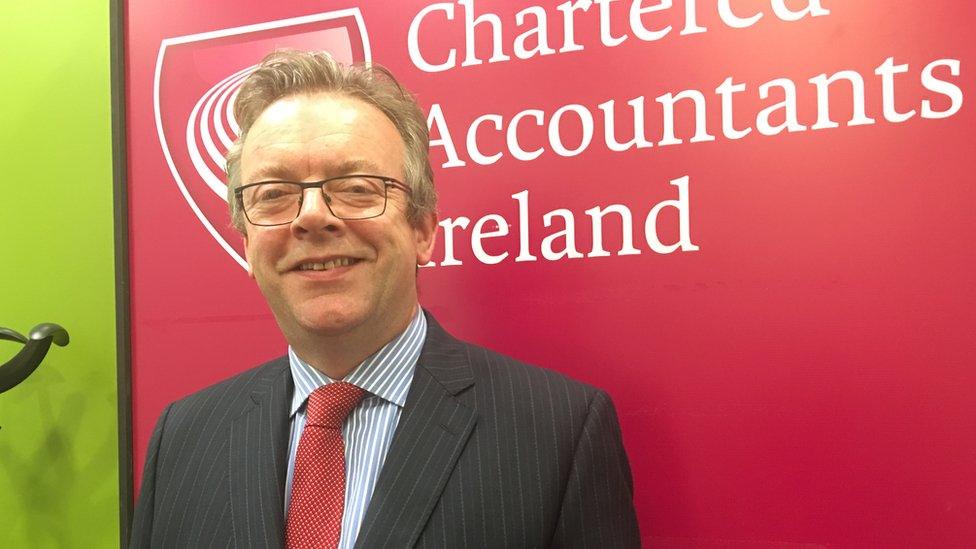
Chartered Accountants Ireland has been hosting a series of seminars in Dublin and Belfast outlining potential risks of the referendum.
"We are part of a taxation and customs union," notes the association director Brian Keegan, one of Ireland's foremost experts on tax matters.
"As the only country in the European Union with a land border with the UK, that has enormous implications for us. We are looking at the possibility for example of customs borders being set up which we haven't seen here for 25-30 years" he said.
"We simply don't know the extent to which the UK leaving the European Union might negatively or positively impact foreign direct investment.
"What we are very clear on is there will be an impact."
- Published13 June 2016
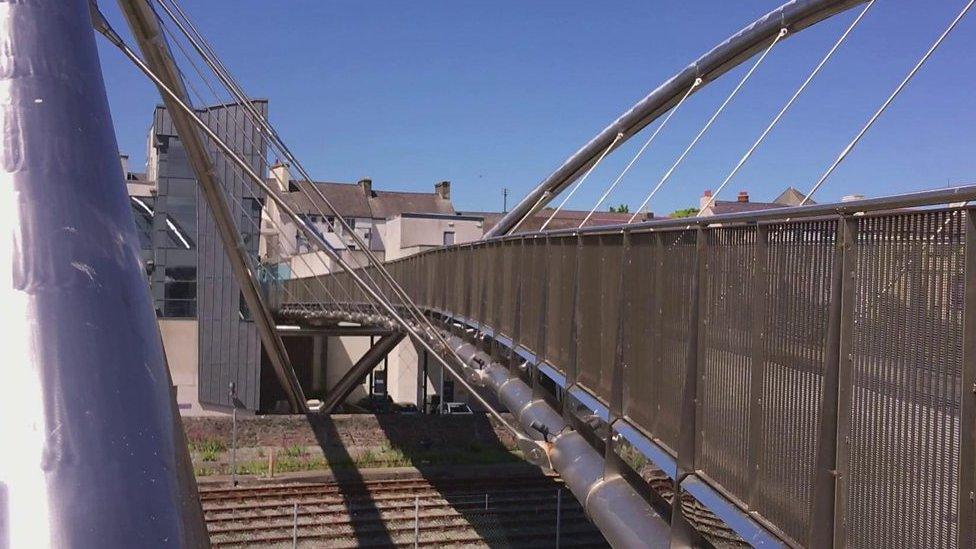
- Published13 June 2016
